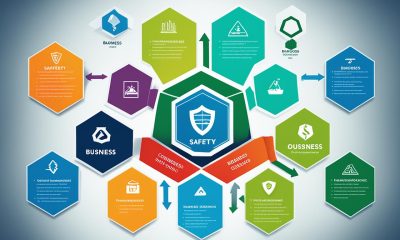Boost Your Credit Score – Expert Tips & Guidance
Welcome to our guide on boosting your credit score. Your credit score is key in determining how creditworthy you are. This can greatly affect your chances to get loans, mortgages, or good interest rates. We’ll give you expert advice on how to improve your credit rating and take charge of your finances.
Want to buy a home or get a credit card? Maybe you want better loan terms. A good credit score is vital. Credit scores, like your FICO score, help lenders decide if you’re likely to pay back debts. By learning about credit scores and taking the right steps, you can better your score. This opens up new financial possibilities.
Key Takeaways:
- Knowing your credit score is important for smart financial choices.
- Your score is affected by payment history, how much credit you use, and how long you’ve had credit.
- It’s key to check your credit score regularly to keep track of your financial health.
- If your credit score is low, there are ways to improve it.
- Keeping a good credit score means using your credit card wisely and making payments on time.
Understanding Your Credit Score
Knowing your credit score is key to your financial health. But what is a credit score, exactly? It shows how well you handle your finances. We’ll take a closer look at credit scores, how they work, and why they matter. We’ll also talk about credit reports and why keeping an eye on them is essential.
The Importance of a Credit Score
Your credit score, or FICO score, shows your creditworthiness. Lenders, landlords, and employers use it to judge your financial responsibility. A high score means you’ve managed your money well, which helps in getting loans and good interest rates.
A low credit score can make it hard to get credit or good rates. It might even affect renting a home, buying a car, or getting a job.
The Different Types of Credit Scores
FICO scores are the most known type of credit score. They range from 300 to 850, where a higher score means less risk. VantageScore is another model that offers a different way to score credit.
How Credit Scores Are Calculated
The formula for credit scores is secret, but certain things affect your score. These include:
- Whether you pay loans and credit cards on time.
- Your credit use percentage.
- How old your credit accounts are.
- The kinds of credit you have.
- How many new credit accounts you’ve opened recently.
The Role of Your Credit Report
Your credit report is the base of your credit score. It lists your credit activities, like your payment history and credit balances. It also shows things like bankruptcies or late payments.
It’s important to check your credit report often. This helps you catch mistakes and see where you can improve. By knowing what’s in your report, you can work on raising your credit score.
Next, we’ll give you tips on improving your credit score and how different factors impact it.
Factors That Affect Your Credit Score
Knowing the factors that change your credit score is crucial. By understanding what changes your score, you can make it better. We’ll look at the main things that impact your credit rating and share tips to enhance them.
Payment History
Your payment history is very important for your credit score. Lenders like to see you pay bills on time. If you pay late or have debts, your score can drop. To boost your score, pay bills by the due date and fix any unpaid accounts quickly.
Credit Utilization
Credit utilization shows how much credit you’re using. It’s best to keep this under 30% of your total credit limit. Using too much credit can hurt your score. To raise your score, pay off balances and don’t max out cards.
Length of Credit History
The time you’ve had credit matters to lenders. They prefer a long history of using credit well. To improve here, start building credit early and keep accounts in good shape.
New Credit Applications
Opening many credit accounts quickly can look bad to lenders. Each new application can lower your score a bit. Try to apply for new credit only when you really need it.
Credit Mix
Having different types of credit, like cards, loans, and mortgages, helps your score. It shows you can handle various credits well. Yet, only borrow what you can handle to avoid hurting your score.
Summary
Understanding how your credit score works is the first step to improving it. Work on good payment habits, watch your credit use, build a long credit history, think carefully about new credits, and have a mix of credits to enhance your score. It’s always a good time to start bettering your score. With patience and smart choices, you can upgrade your credit rating and enjoy the perks of a higher score.
| Factors | Impact on Credit Score | How to Improve |
|---|---|---|
| Payment History | Significant | Make on-time payments, address delinquent accounts |
| Credit Utilization | High | Keep credit utilization below 30%, pay down balances |
| Length of Credit History | Medium | Establish credit early, maintain accounts in good standing |
| New Credit Applications | Low | Limit new credit applications, apply only when necessary |
| Credit Mix | Low | Diversify credit accounts responsibly |
Checking Your Credit Score
Understanding your financial health means checking your credit score often. This three-digit number shows how trustworthy you are with money. It’s key in getting good financial deals.
Importance of Checking Your Credit Score
Knowing your credit score helps you understand your financial standing. It shows if there are any mistakes or frauds in your credit report. This insight is crucial for smart financial moves.
Monitoring your score also alerts you to fraud or identity theft. Quick action can protect your credit and financial health.
How to Check Your Credit Score
There are several ways to check your credit score:
- Free Credit Score Websites: These sites provide your score and report for free. They offer tips on improving your credit score too.
- Credit Card Statements: Many credit card companies give monthly score updates. This lets you easily track your credit health.
- Credit Reporting Agencies: Agencies like Equifax, Experian, and TransUnion offer detailed credit monitoring. They also help protect against fraud.
Make checking your credit score a regular habit to avoid surprises.
What Constitutes a Good Credit Score?
A good credit score falls between 670-739. A score in this range means you’re seen as dependable by lenders. This can lead to better loan conditions.
Remember, different situations may require various credit scores. For major loans like mortgages, higher scores get you better rates.
Monitor your credit score to make better choices. It’s crucial for achieving your financial goals. Don’t underestimate its power in your financial life.
Dealing with a Bad Credit Score
If you’re dealing with a bad credit score, don’t worry. You can take steps to rebuild your credit and face the challenges of a low credit rating. By acting now, you can better your financial status and aim for a higher credit score.
1. Assess Your Credit Report
First, get your credit report from a big bureau like Equifax, TransUnion, or Experian. Look through it for errors that could hurt your score. If you find mistakes, tell the credit bureau to fix or remove them.
2. Make Timely Payments
How you pay bills is key to your credit score. Pay everything on time, including credit cards, loans, and utilities. Use automatic payments or set reminders to help you keep track and avoid being late.
3. Reduce Your Debt
High debt can hurt your credit score a lot. Make a plan to pay off what you owe quickly. You might consolidate your debts or talk to creditors for easier repayment terms.
4. Use Credit Wisely
It might seem good to avoid credit, but using it right is better for your score. Don’t close all your accounts. Instead, use them a little and repay in full monthly. This shows you’re good with credit.
5. Seek Professional Advice
If fixing your credit score alone is hard, get help from a credit counselor. They can offer advice and a plan just for you. Make sure you find a trustworthy credit counseling service.
Fixing your credit takes time and patience. Keep at it, and you’ll slowly see better scores. Stay positive and consistent in your efforts.
Rebuilding Your Credit: A Success Story
“After working hard for months, Angela improved her bad credit. She fixed errors on her credit report and paid bills on time. By lowering her debt and using credit wisely, her score gradually rose. Now, she enjoys the benefits of a strong credit rating.”
| Strategies for Dealing with a Bad Credit Score | Key Takeaways |
|---|---|
| Assess your credit report for errors and dispute incorrect information | Regularly review your credit report to ensure accuracy |
| Make timely payments for all your bills | Payment history is a crucial factor in determining your credit score |
| Reduce your debt by developing a repayment plan | High levels of debt can negatively impact your credit score |
| Use credit wisely, making small purchases and paying them off in full each month | Show lenders that you can handle credit responsibly |
| Seek professional advice from a credit counselor if needed | Professional guidance can help develop a tailored plan for credit improvement |
Maintaining a Healthy Credit Score
Getting a good credit score is just the start. Keeping it up is next. It’s important to keep doing things that help your credit score stay high. This will make sure you’re always ready for big financial steps in the future.
We’ll show you how to keep your score up. Let’s dive into the best ways to do this.
Responsible Credit Card Usage
Using your credit card right is key to a good score. Don’t spend more than you need. And try to use less than 30% of your credit limit. This shows you’re smart with money.
Paying your bill on time every month is also crucial. It proves you’re reliable. And this helps keep your score strong.
Timely Payment
Paying on time keeps your score healthy. Late payments can hurt it. So, it’s a good idea to set reminders or auto-pay.
This way, you won’t miss payments. And your score won’t drop because of forgetfulness.
Managing Debt Effectively
Handling your debt well is important. Keep your debt lower than your income. And always have a plan for paying back what you owe.
This shows you’re careful with money. Lenders will trust you more. And your credit score will reflect that.
Remember, a good credit score needs you to be steady and disciplined. Stick to these steps to keep your score healthy. Then, enjoy the perks of having a strong credit history.
“Consistently practicing habits that contribute to a healthy credit score will ensure financial stability and unlock opportunities for future endeavors.”
Summary Table: Strategies to Maintain a Healthy Credit Score
| Strategies | Description |
|---|---|
| Responsible Credit Card Usage | Avoid overspending and keep credit utilization low. |
| Timely Payment | Consistently make payments on time to avoid negative entries on your credit report. |
| Managing Debt Effectively | Create a repayment plan and maintain a healthy debt-to-income ratio. |
Conclusion
Your credit score is key to your money health. Knowing what impacts your score and managing it helps build a strong financial future.
We’ve shared tips on boosting your credit score, checking it often, and fixing a bad score. Good credit scores come from wise credit use, paying on time, and managing debts well.
Use our advice to improve your credit score. This way, you can get better loan rates and more finance options. Start now to boost your credit score and aim for a successful future.
FAQ
What is a credit score?
What is a credit rating?
What is a FICO score?
How can I improve my credit score?
How can I check my credit score?
What is considered a good credit score?
What is considered a bad credit score?
How do factors affect my credit score?
How often should I check my credit score?
How can I deal with a bad credit score?
What can I do to maintain a healthy credit score?
-

 Financial Education12 months ago
Financial Education12 months agoEmpowering Your Future with Financial Education
-

 Financial Education12 months ago
Financial Education12 months agoBoost Your Credit Score Improvement Tactics Now
-

 Financial Market12 months ago
Financial Market12 months agoRisk Assessment Strategies for Business Safety
-

 Financial Market12 months ago
Financial Market12 months agoEssential Guide to Economic Indicators 2023
-

 Financial Market12 months ago
Financial Market12 months agoMaximize Wealth with Smart Investment Strategies
-

 Financial Market12 months ago
Financial Market12 months agoSmart Retirement Planning Strategies for You
-

 Credit Cards12 months ago
Credit Cards12 months agoEssential Fraud Protection Strategies for Security
-

 Financial Education12 months ago
Financial Education12 months agoAchieve Your Financial Independence Journey


